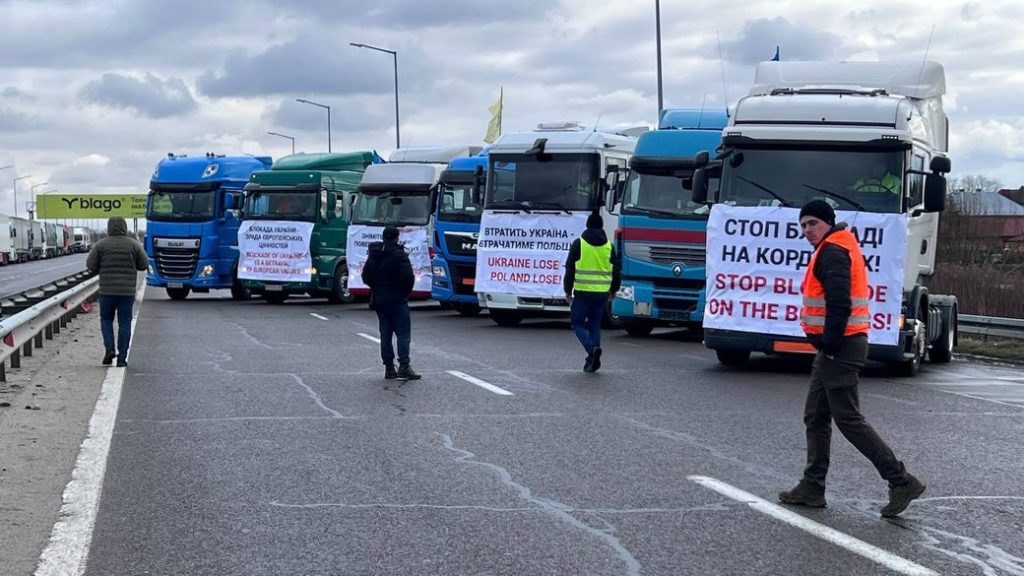Polish farmers terminate border blockade with Ukraine, easing tensions
After months of protests, Polish farmers have ceased their blockade of the last border crossing with Ukraine, a move welcomed by both Kyiv and Warsaw as a step towards resolving bilateral strains.


On 29 April, Polish farmers stopped protesting at the last blocked border crossing with Ukraine, ending a blockade that has lasted for months and worsened relations between both countries, Kyiv and Warsaw said, according to Reuters. At the same time, trucks carrying grain crops will be prohibited from entering Poland.
Following late last year’s end of a Polish truckers’ blockade disrupting Ukrainian aid and goods supplies, including drone parts, Polish farmers launched nationwide protests in February. They blocked checkpoints, affecting truck movement and disrupting ports and roads. This action benefited Russia by undermining Ukraine’s economy amid its two-year war.
Ukraine’s agriculture minister, Mykola Solskyi, has hailed Poland’s efforts to lift the blockade, describing the negotiations with Warsaw and industry associations as challenging but ultimately successful.
“Fortunately, we have all directions on the border with Poland unblocked,” said Ukrainian Border Guard Spokesperson Andrii Demchenko.
He confirmed that Polish farmers allowed access to the Rava-Ruska crossing, and trucks had resumed crossing the border in both directions on the morning of 29 April.
Andrzej Juzwiak, the spokesperson for the Polish Border Guard Service, said that access to Ukraine through all border crossings was unimpeded.
Since late autumn of 2023, Polish farmers and truckers began blockading border crossings with Ukraine, expressing grievances over unfair competition. They’ve pointed to government inaction in addressing their loss of business to foreign competitors since the onset of Russia’s war against Ukraine.
However, with the blockade lifted, trucks carrying grain products, which were at the center of Polish protesters’ concerns, will still face certain restrictions, said the Ukrainian Border Service.
According to a Ukrainian investigative journalist team, despite the blockade of Ukrainian grain, Poland has continued to import agriculture from Russia and Belarus.
Poland’s paradox: blockading Ukraine trade, continuing Russia imports
Journalists even identified three Polish companies among the largest Russian agricultural product buyers: Bromex, Diaspolis, and Kampol. They also filmed how these companies receive cargo.
On 20 February, Polish farmers spilled Ukrainian grain at least at one location. Meanwhile, Ukrainian truckers initiated their counter-protest at three Ukrainian checkpoints, blocking Polish trucks until Poland lifted the blockade.
Ukraine’s Ambassador to Poland, Vasyl Zvarych, stated that the spilled grain, not owned by Polish farmers, symbolized disrespect for agricultural work and a moral and legal violation. The Ukrainian side strongly condemned these protest actions. He highlighted that such behavior is unworthy of Polish society, which has shown solidarity with Ukraine amid Russia’s war. While Ukrainian soldiers defend against Russian aggression, Polish farmers can safely work their fields and benefit from Ukrainian labor, earning profits and EU subsidies, Zvarych said.
The Ukrainian Border Guard Service confirmed that the termination of the blockade, “trucks transporting grain crops will not be allowed to enter Poland. This type of cargo can only travel through Poland in transit mode.”
Nevertheless, some Ukrainian officials remain optimistic about the future prospects of grain transporting via Poland.
“I believe that such blockades are a thing of the past. Instead of blocking, we will cooperate even more closely,” said Zvarych.
Warsaw and Kyiv have been engaged in negotiations to solve the problem, and Ukraine also asked the European Union to intervene. In March, the countries made some progress in talks about importing agricultural goods. However, reaching a final deal has been challenging because the states had different views on the importance of their economies and security.
Read also:
- Poland’s paradox: blockading Ukraine trade, continuing Russia imports
- Polish protesters block all six checkpoints with Ukraine
- Polish diplomat in Ukraine: ‘I thought only Russians could behave so shamefully’
- Polish farmers block Ukraine border, spill grain, as Ukrainian truckers protest against blockade
You could close this page. Or you could join our community and help us produce more materials like this.
We keep our reporting open and accessible to everyone because we believe in the power of free information. This is why our small, cost-effective team depends on the support of readers like you to bring deliver timely news, quality analysis, and on-the-ground reports about Russia's war against Ukraine and Ukraine's struggle to build a democratic society.
A little bit goes a long way: for as little as the cost of one cup of coffee a month, you can help build bridges between Ukraine and the rest of the world, plus become a co-creator and vote for topics we should cover next. Become a patron or see other ways to support.


